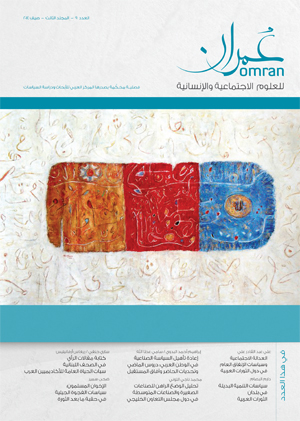The latest issue of Omran, a quarterly social sciences journal published by the ACRPS, is devoted to economic and development issues, with particular focus on questions of industrial production. Published since 2012, this summer edition constitutes the ninth issue of the journal, with Azmi Bishara serving as its Editor in Chief.
Omran’s ninth issue opens with an essay by Sudanese researcher Ali Abdelqader Ali on “Social Justice and Public Expenditure in Arab Spring States”, an essay that examines the challenges faced by Arab revolution states when formulating public expenditure policies that meet revolution demands. Abdelqader Ali suggests that the challenge of formulating a public expenditure policy in line with the revolutions’ aspirations for social justice lies in the inability of international development agencies, such as the IMF, to propose new and innovative ideas in formulating development policy. Darem Bassam contributes “Alternative Development Policies in Arab Revolution States” in an attempt to refine the conceptual and theoretical bases for alternative development policies in those Arab states affected by revolutions. Bassam’s paper uses contextualized analyses, taking into account the importance of local specificities when proposing policy alternatives. In a study co-authored by Ibrahim Ahmad Badawi and Sami Attallah, titled “Rehabilitating Industrial Policy in the Arab world: Past Lessons, Present Challenges, and Future Prospects”, the two researchers propose a new Arab industrial strategy. They argue that new industrial policy must be formulated on new and innovative foundations that rest on existing productive capacity in the economy in order to delimit the nature and extent of government intervention, and on the institutional mechanisms to achieve “integrated independence” for the public sector in its relationship with the private sector. Also featured is an essay on “Small and Medium-Sized Industry in the GCC States” by Mohammed Naji Al Tuni, which looks at the increased support for SMEs by the governments of the GCC over the past two decades. 
Co-written by Sari Hanafi and Rigas Arvanitis is a paper on “Writing Op-eds in Lebanese Newspapers: The Relative Demise of Public Life of Arab Academics”. The paper explores why academics contribute to opinion articles in the press, the extent of their contribution and whether academics’ contributions serve to bolster a newspaper’s editorial approach, or balance it. Finally, Doha Samir provides an examination of the internal dynamics of the Muslim Brotherhood, focusing specifically on battles between the different age groups within the organization in her paper “The Muslim Brotherhood: Generation Gap in the Post-January 25 Period”.
This ninth edition of Omran also includes a number of book reviews and extended articles, including, “Spontaneity and Agency in Human Action” by Shihab Al Yahyawi; and Walid Noueihed’s “An Examination of the Arab Revolutions and the Threat of Falling Back to Square One”.
To buy this, earlier editions of Omran and other ACRPS periodicals and books, please visit the ACRPS Bookstore, here (link in Arabic).